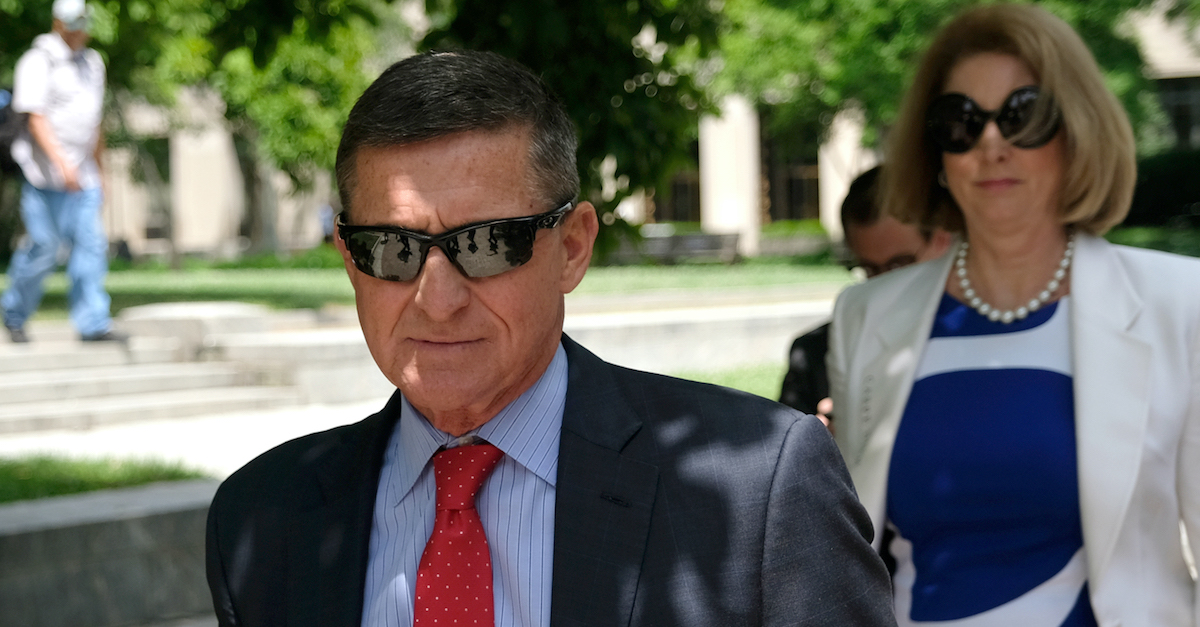
Michael Flynn’s legal team caused a stir when they ran to the U.S. Court of Appeals for the District of Columbia Circuit with a writ of mandamus, asking the appellate court to direct lower U.S. District Judge Emmet Sullivan to “grant the Justice Department’s Motion to Dismiss” Flynn’s case instead of dragging things out any longer. Although seen by some as a risky move, the D.C. Circuit has ordered Judge Sullivan to address Flynn’s petition and explain himself.
The order from the D.C. Circuit notably invites the Department of Justice to weigh in as well.
“Upon consideration of the emergency petition for a writ of mandamus, it is ORDERED, on the court’s own motion, that within ten days of the day of this order the district judge file a response addressing petitioner’s request that this court order the district judge to grant the government’s motion to dismiss filed on May 7, 2020,” reads the order from Circuit Judges Karen LeCraft Henderson, Neomi Rao and Robert L. Wilkins (appointed by Presidents George H.W. Bush, Donald Trump and Barack Obama, respectively).
“The government is invited to respond in its discretion within the same ten-day period,” the D.C. Circuit added.
Reading between the lines here, Judge Sullivan is going to have to explain why Rule 48(a) of the Federal Rules of Criminal Procedure and United States v. Fokker Services give him the authority to keep alive the Flynn case when both prosecution and the defense want the case dismissed. Rule 48(a) deals with dismissal of a case by the government and says: “The government may, with leave of court, dismiss an indictment, information, or complaint. The government may not dismiss the prosecution during trial without the defendant’s consent.”
The words “with leave of court” likely loom the largest here. Fokker is a prosecutorial discretion case that, perhaps crucially, the D.C. Circuit is quite familiar with:
On April 5, 2016, the U.S. Court of Appeals for the District of Columbia Circuit (the D.C. Circuit) overturned the decision of the U.S. District Court for the District of Columbia (the District Court) in United States v. Fokker Services B.V., finding that the requirement of court approval to exclude time under the Speedy Trial Act does not grant judges the authority “to second-guess the Executive’s exercise of discretion over the initiation and dismissal of criminal charges.” The District Court opinion had provoked considerable interest from both prosecutors and the defense bar, raising questions over the interplay between prosecutorial discretion and judicial review of criminal settlements. In finding the District Court had overstepped its authority, the D.C. Circuit confirmed that charging decisions (as opposed to sentencing) are firmly within the purview of the executive branch, and that deferred prosecution agreements concern the core prosecutorial decisions about what charges to bring and, if brought, whether to dismiss them.
Judge Sullivan controversially appointed as amicus curiae John Gleeson after the DOJ controversially moved to dismiss the Flynn case—after Flynn pleaded guilty to lying to the FBI but before he could be sentenced. Sullivan even ordered Gleeson to make arguments as to why Flynn shouldn’t be held in criminal contempt. The detailed schedule Sullivan set on Tuesday showed once more that Sullivan has no intention of swiftly and robotically dismissing the case.
[Image via Alex Wroblewski/Getty Images]